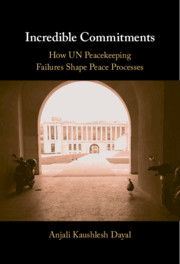Book contents
- Incredible Commitments
- Incredible Commitments
- Copyright page
- Contents
- Tables
- Acknowledgments
- 1 Introduction
- 2 The Social Context of International Peacekeeping and the Alternative Benefits of Bargaining
- 3 Methods and Case Selection
- 4 The Arusha Negotiations, 1990–1994
- 5 Guatemala, 1989–1996
- 6 Conclusion
- Bibliography
- Index
4 - The Arusha Negotiations, 1990–1994
UNAMIR in the Shadow of Somalia
Published online by Cambridge University Press: 02 October 2021
- Incredible Commitments
- Incredible Commitments
- Copyright page
- Contents
- Tables
- Acknowledgments
- 1 Introduction
- 2 The Social Context of International Peacekeeping and the Alternative Benefits of Bargaining
- 3 Methods and Case Selection
- 4 The Arusha Negotiations, 1990–1994
- 5 Guatemala, 1989–1996
- 6 Conclusion
- Bibliography
- Index
Summary
Chapter 4 examines the conflict resolution processes surrounding the 1990-1994 civil war in Rwanda; what effect the UN’s past performance had on the Rwandan peace process; how peacekeeping failures in Somalia and Burundi may have shaped the conflict in the crucial months between the Arusha Accords and the genocide; and what led the Rwandan Patriotic Front (RPF) to invite a second UN peace operation into Rwanda following the first mission’s cataclysmic failure. Drawing on archival material and interviews, I argue the negotiating table at Arusha was populated by desperate negotiators who had to settle because they could no longer fight; by hardliners who used the negotiation process to pursue tactical, distributional, and symbolic goals other than peace; and by spoilers who ultimately strove to break the peace. In this context, the international community’s unique abilities to assist in demobilization and refugee resettlement, and their ability to confer legitimacy upon political groups, were important dimensions of negotiations. In the turbulent aftermath of genocide, amidst massive population transfers and the RPF’s consolidation of power, the RPF’s desire to be viewed as legitimately pursuing post-conflict peace, rather than exacting retribution on political opponents, was a key reason to seek out UN assistance.
Keywords
- Type
- Chapter
- Information
- Incredible CommitmentsHow UN Peacekeeping Failures Shape Peace Processes, pp. 79 - 130Publisher: Cambridge University PressPrint publication year: 2021

